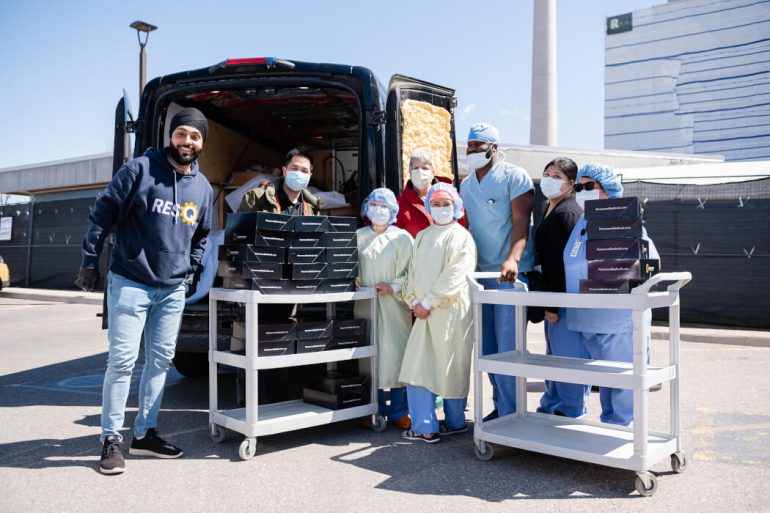Armed with about $9.75 million CAD ($7.5 million USD) in previously unannounced seed funding, Toronto-based restaurant software startup ResQ is looking to build on its recent growth and help more restaurants lower their operational costs as they reopen following COVID-19 shutdowns.
The all-equity round, which closed in December, was led by Homebrew, Golden Ventures, and Inovia Capital. The round was supported by Nilam Ganenthiran of Instacart, Gokul Rajaram of Doordash, Lenny Rachitsky of Airbnb, Jeff Adamson and Andrew Chau of SkipTheDishes, and Maple Ventures. It also saw participation from some of ResQ’s restaurant customers, including Soul Foods, a global franchisee of Yum! Brands.
“We’re seeing a big, big shift in terms of the adoption of technology,” said Kuljeev Singh, ResQ’s CEO.
In an interview, Kuljeev Singh, ResQ’s founder and CEO, said ResQ waited to announce the December raise until now because it “wanted to be mindful” of celebrating given the degree to which restaurants were suffering at the time amid pandemic shutdowns. Singh said the startup still has “the majority of the capital” from its seed round.
Founded in 2018, ResQ offers an end-to-end repair and maintenance app for restaurants. The Toronto company’s SaaS-enabled marketplace connects restaurants to service providers, helping them request, manage, and pay for repair and maintenance services. ResQ also offers restaurants data and insights to enable them to “optimize back-of-house operations” and drive down operational costs.
ResQ currently serves over 3,000 global restaurant groups in the fast food and full-service sectors. The firm’s clients include KFC, Taco Bell, Pizza Hut, Wendy’s, Arby’s, The Keg, Cactus Club Cafe, Paramount, Fresh, and Tim Hortons.
While startup’s clients mainly include multi-unit operators, Singh said ResQ also serves single-unit, independent groups like local restaurants and craft breweries. ResQ makes money by charging a membership fee to restaurants as well as fees on the service contractor side.
RELATED: ResQ uses platform to help service industry deliver meals to frontline workers
ResQ experienced tremendous growth over the past year, as restaurants sought to cut costs and increase their operational efficiency during COVID-19. Pre-pandemic, ResQ had about 20 employees and operated only in Toronto. Over the last 12 months, the startup launched in eight new markets across the United States (US) and Canada, tripled the size of its team, and experienced revenue growth of 750 percent.
ResQ’s seed financing brings the company’s total funding to date to around $11.7 million CAD ($9 million USD). In 2019, ResQ secured nearly $2 million CAD ($1.5 million USD) in pre-seed capital from undisclosed angel investors, some of whom reinvested as part of the firm’s seed raise.
Singh told BetaKit that, in order to successfully emerge from COVID-19, restaurants “need to consider how to turn back-of-house operations into a revenue recovery opportunity.” The CEO highlighted that restaurants typically have thin profit margins to begin with, and COVID-19 made things even more difficult for them. Singh argued that, for restaurants, the way forward post-pandemic involves the adoption of new technologies, a shift he thinks the pandemic accelerated.
RELATED: 7shifts secures $21.5 million Series B round to scale restaurant staff platform
“We’re seeing a big, big shift in terms of the adoption of technology,” said Singh. “I believe in the last four months, more tech has been adopted at restaurants, than in the year or years combined, before that.”
According to the CEO, most tech innovation for restaurants occurs “front-of-house,” on the customer-facing side, citing UberEats as an example. “Back-of-house” operations, said Singh, are “extremely menial” and have been neglected by many restaurants up to this point. These back-end operations include maintenance and repairs, such as cooking equipment fixes.
Singh said the average restaurant spends three to five percent of its annual sales on repairs and maintenance. The CEO claims that by offering competitive rates and process and communication improvements, ResQ helps restaurants save 10 to 30 percent on repair and maintenance spend per year.
RELATED: Digital Main Street launches pilot with Deliverect to support Toronto restaurants
“ResQ has struck a chord with restaurants by working diligently to support its customers throughout the pandemic,” said Karam Nijjar, partner at Inovia. “Now the company’s coast-to-coast expansion across North America speaks to how urgent the challenge is for restaurants to reach operational efficiency at scale given the massive pent-up demand that we’re seeing across the industry.”
When the pandemic hit, ResQ also launched a community-led initiative designed to help the service industry deliver meals to frontline workers and COVID-19 patients. In total, the startup said it purchased over 10,000 meals from local restaurants through its platform.
Singh said ResQ is now ready to double down on its existing markets, and continue its expansion efforts across Canada and the US, identifying a lot of opportunity for growth as restaurant markets continue to reopen.
ResQ plans to grow to 100 employees by the end of the year and is looking to hire for all parts of its business. Singh said the startup will likely “raise [its] next round in the next 12 months … maybe even earlier.”
Photo courtesy of ResQ


